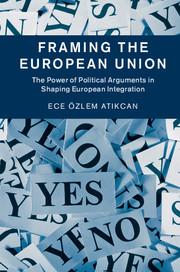Crossref Citations
This Book has been
cited by the following publications. This list is generated based on data provided by Crossref.
Sternberg, Claudia
2017.
Public opinion in the EU institutions’ discourses on EU legitimacy from the beginnings of integration to today.
Politique européenne,
Vol. N° 54,
Issue. 4,
p.
24.
Usherwood, Simon
and
Wright, Katharine AM
2017.
Sticks and stones: Comparing Twitter campaigning strategies in the European Union referendum.
The British Journal of Politics and International Relations,
Vol. 19,
Issue. 2,
p.
371.
2017.
The Routledge Handbook to Referendums and Direct Democracy.
p.
149.
Schneider, Christina J.
2018.
The Responsive Union.
Silagadze, Nanuli
and
Gherghina, Sergiu
2018.
When who and how matter: explaining the success of referendums in Europe.
Comparative European Politics,
Vol. 16,
Issue. 5,
p.
905.
Dekavalla, Marina
2018.
Reporting the Road to Brexit.
p.
61.
ATIKCAN, ECE ÖZLEM
2018.
Agenda control in EU referendum campaigns: The power of the anti‐EU side.
European Journal of Political Research,
Vol. 57,
Issue. 1,
p.
93.
Atikcan, Ece Özlem
and
Chalmers, Adam William
2019.
Choosing lobbying sides: the General Data Protection Regulation of the European Union.
Journal of Public Policy,
Vol. 39,
Issue. 4,
p.
543.
Blings, Steffen
and
Gattig, Alexander
2019.
Exploring the potential for common European politics: cross-national commonalities and differences in the European constitutional referendums.
Journal of European Integration,
Vol. 41,
Issue. 6,
p.
711.
Rose, Richard
2019.
Referendum challenges to the EU’s policy legitimacy – and how the EU responds.
Journal of European Public Policy,
Vol. 26,
Issue. 2,
p.
207.
Maher, Richard
2021.
International Relations Theory and the Future of European Integration.
International Studies Review,
Vol. 23,
Issue. 1,
p.
89.
Atikcan, Ece Özlem
2021.
The Palgrave Handbook of European Referendums.
p.
109.
Nadeau, Richard
Bélanger, Éric
and
Atikcan, Ece Özlem
2021.
Emotions, cognitions and moderation: understanding losers’ consent in the 2016 Brexit referendum.
Journal of Elections, Public Opinion and Parties,
Vol. 31,
Issue. 1,
p.
77.
Sternberg, Claudia
2021.
The Palgrave Handbook of European Referendums.
p.
583.
Tsirbas, Yannis
and
Zirganou-Kazolea, Lina
2022.
Greek political scientists under the crisis and the case of the Greek bailout referendum: an intellectual barricade protecting the status quo?.
European Political Science,
Vol. 21,
Issue. 1,
p.
58.
Malet, Giorgio
2022.
Cross-National Social Influence: How Foreign Votes Can Affect Domestic Public Opinion.
Comparative Political Studies,
Vol. 55,
Issue. 14,
p.
2416.
Gellwitzki, C. Nicolai L.
and
Houde, Anne‐Marie
2022.
Feeling the Heat: Emotions, Politicization, and the European Union.
JCMS: Journal of Common Market Studies,
Vol. 60,
Issue. 5,
p.
1470.
Wendler, Frank
2022.
Framing Climate Change in the EU and US After the Paris Agreement.
p.
35.
Oppermann, Kai
2023.
Mapping party support for EU referendums after Brexit: results from an expert survey.
Journal of Contemporary European Studies,
Vol. 31,
Issue. 2,
p.
409.
Gellwitzki, C. Nicolai. L.
and
Houde, Anne-Marie
2024.
From
Realpolitik
to
Gefühlspolitik
: strategically narrating the European Union at the national level
.
Journal of European Public Policy,
Vol. 31,
Issue. 2,
p.
403.



